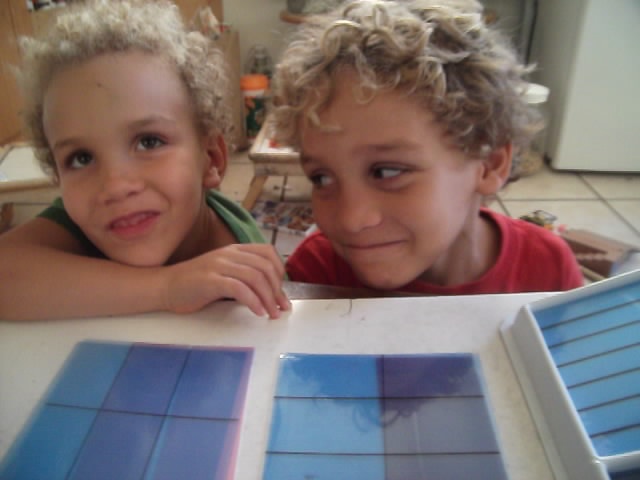You have to do a lot of preparation before you dive in and start adding problems like these.
You need to understand basic concepts like SAME and ONE. But basically all you have to be able to do is count. You don't have to be able to add and multiply although it helps.
Fractions concepts are easy. Any little kid can learn them and understand them, it's that much better if you let them fool around and DISCOVER concepts and how things work for themselves while you give copious amounts of encouragement and direction.
Working with very young students is similar to working with SPED and other "learning disabled" or "special needs" children because often what you have is "developmental retardation" or to be plain many Downs Syndrome and Autistic students who are in their teens are in about the same developmental stage as very young children. Very young children can learn math concepts as proved consistantly on this blog, ergo: SPED kids CAN learn math.
This isn't rocket science. Simple logic.
Here are a five and six year old playing math. Fractions. They have very limited experience with fractions and still can't multiply easily because the don't know their multiplication tables completely yet, but they can learn fractions and begin to understand the concepts. Now if SPED kids and little kids can learn fractions then certainly high school kids and adults can also learn it, even the "problem" children...who aren't particularly disabled or SPED but may be special needs because of circumstances at home, like poverty or parents who use drugs or alcohol etc. Sadly most of you know what I'm talking about because it's more and more common in public schools.
Here they are playing a game where they try to discover the fraction from the disguise it's wearing and they literally get to pull off the disguise once they figure it out.
They do not have enough experience to go about it methodically, but they do have natural thinking skills...and with me as a guide they can be directed to the answers by simple questions. Remember remove the "no" from the lesson. Allow them to explore and discover for themselves. Ask "what if" questions, count, see what they have.
Once we get through some of this we can do some simple addition and see how that works. Also we are headed for story problems and these activities get them ready for that too. There are also everyday math activities that help them make sense of the symbols and numbers when they see them. Also check out this post where they fool around with food and no symbols to help them understand what's going on with fractions.
Also note how the younger boy is very much a participant in this and often gets the answer before his older sibling.
Let them discover and have fun! You will even hear them say "Don't tell us!" The joy of discovery makes learning math (or anything else) FUN.
The whole video in one piece is available on youtube and on my website here. [Link not built yet.]
To get a fractions kit,
check my expanding product exchange:
http://www.crewtonramoneshouseofmath.com/product-exchange.html
Also don't forget these free fractions worksheets.



No comments:
Post a Comment